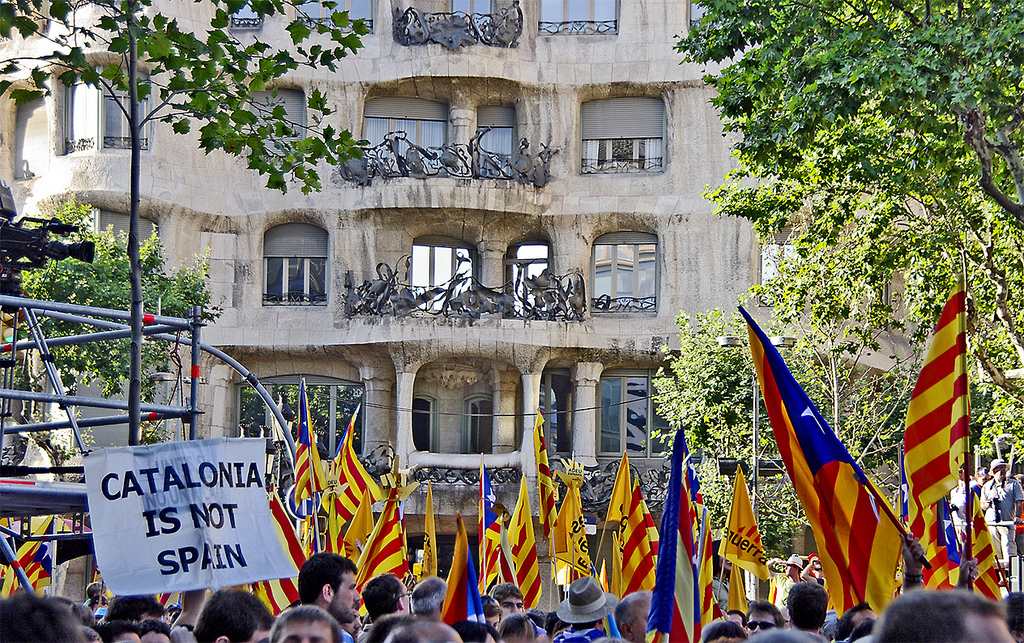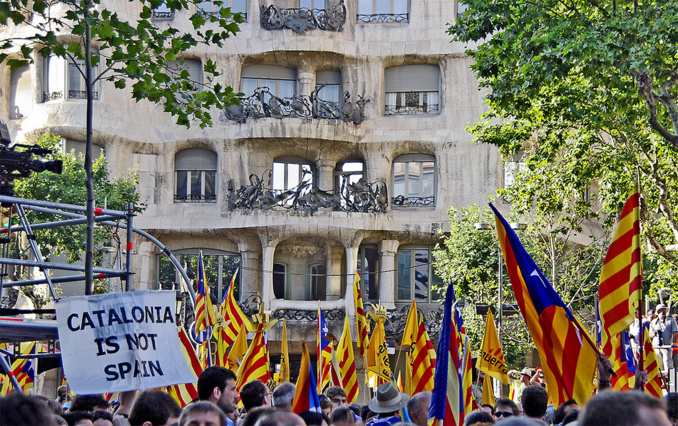“I will not tolerate new violations of the country's constitution in Catalonia,” said Pedro Sanchez, speaking in the Spanish parliament yesterday. “We contacted the Catalan authorities and informed them that if they continue to behave in this way, we will deploy the national security forces ".
Thus, the politician reacted to actions of the regional police during seizure of checkpoints in Catalonia on Saturday, December 8. Then, activists of the separatist movement “Committees for the Defense of the Referendum” for 15 hours were blocking the AP-7 toll road running almost along the entire east coast of the country. The protesters piled stones and trees on the section of the road in the municipality of L'Ampolla, province of Tarragona. The police of Catalonia - Mossos d'Esquadra - did not detain them and did not try to restore movement of vehicles.
The next day, the same "Committees for the Defense of the Referendum" re-seized several checkpoints on toll roads in the three provinces of Catalonia, this time, on the contrary, declaring travel free. Social networks supported the action with hashtags "Open the barriers of the regime" and "40 years of shame." The latter refers to the anniversary of the Spanish constitution, which was adopted on December 7, 1978. The separatists regard this law as the main cause of the region’s problem: it does not stipulate the right of autonomy to self-determination. The local police again did not respond to what was happening, and so Pedro Sanchez called it "inexcusable inaction."
Yesterday Pedro Sanchez once again emphasized: “Nothing can divide society more than a referendum,” and the only solution to the problem is “a dialogue about great opportunities for self-government, but only within the framework of the constitution.” The Prime Minister of Spain promised that everything that goes beyond the law will be given a "firm but calm, proportional and uncompromising response." At the same time, he noted that he meant only enhanced control over the region, not reapplying the 155th article.
Leaders of the leading center-right forces of Spain - Ciudadanos and Popular Party - Albert Rivera and Pablo Casado considered such a reaction to be mild and demanded that the 155th article be applied in order to restore order in Catalonia. At the same time, Mr. Rivera doubted ability of the socialist Prime Minister to settle the situation and appealed to him: “Set an election date (to the Spanish parliament), declare it, put the ballot boxes, may we finally have a strong government.” Pablo Casado supported the idea.
source: elpais.com
Thus, the politician reacted to actions of the regional police during seizure of checkpoints in Catalonia on Saturday, December 8. Then, activists of the separatist movement “Committees for the Defense of the Referendum” for 15 hours were blocking the AP-7 toll road running almost along the entire east coast of the country. The protesters piled stones and trees on the section of the road in the municipality of L'Ampolla, province of Tarragona. The police of Catalonia - Mossos d'Esquadra - did not detain them and did not try to restore movement of vehicles.
The next day, the same "Committees for the Defense of the Referendum" re-seized several checkpoints on toll roads in the three provinces of Catalonia, this time, on the contrary, declaring travel free. Social networks supported the action with hashtags "Open the barriers of the regime" and "40 years of shame." The latter refers to the anniversary of the Spanish constitution, which was adopted on December 7, 1978. The separatists regard this law as the main cause of the region’s problem: it does not stipulate the right of autonomy to self-determination. The local police again did not respond to what was happening, and so Pedro Sanchez called it "inexcusable inaction."
Yesterday Pedro Sanchez once again emphasized: “Nothing can divide society more than a referendum,” and the only solution to the problem is “a dialogue about great opportunities for self-government, but only within the framework of the constitution.” The Prime Minister of Spain promised that everything that goes beyond the law will be given a "firm but calm, proportional and uncompromising response." At the same time, he noted that he meant only enhanced control over the region, not reapplying the 155th article.
Leaders of the leading center-right forces of Spain - Ciudadanos and Popular Party - Albert Rivera and Pablo Casado considered such a reaction to be mild and demanded that the 155th article be applied in order to restore order in Catalonia. At the same time, Mr. Rivera doubted ability of the socialist Prime Minister to settle the situation and appealed to him: “Set an election date (to the Spanish parliament), declare it, put the ballot boxes, may we finally have a strong government.” Pablo Casado supported the idea.
source: elpais.com



















